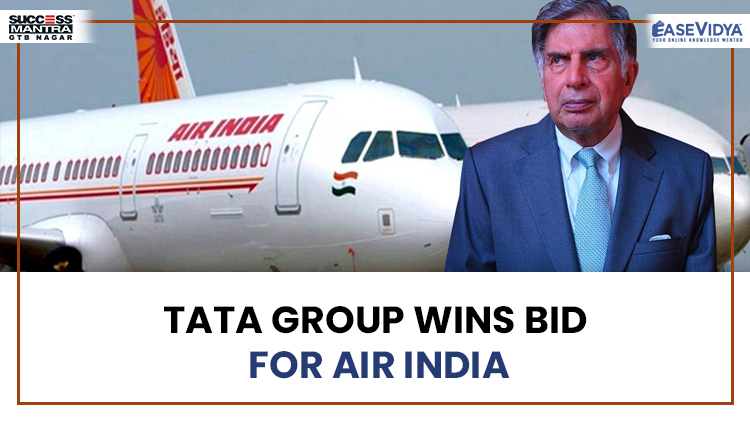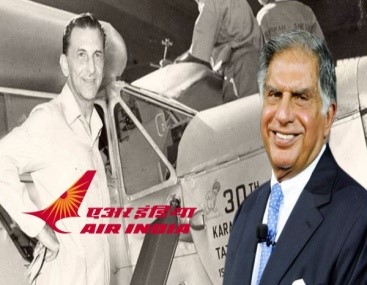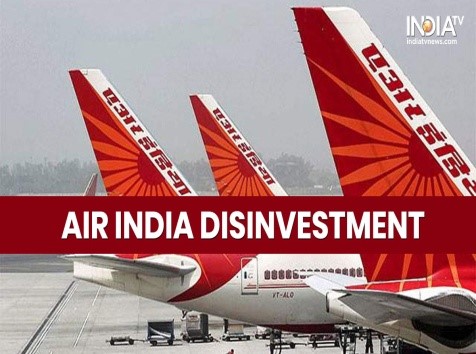
TATA GROUP WINS BID FOR AIR INDIA
TATA GROUP WINS BID FOR AIR INDIA
Tata Sons has been declared as the winning bidder for the Air India sale on October 8, 2021, said Tuhin Kanta Pandey, Secretary, Department of Investment and Public Asset Management (DIPAM). Among the frontrunners to buy Air India, Tata Sons submitted a financial bid worth Rs 18,000 crores. Tata Sons and SpiceJet Chairman Ajay Singh had placed their financial bids for Air India. Air India's divestment was a bold plan by the PM Modi-led government towards the privatization of India’s flag carrier Air India and the second attempt of the government to sell the loss-making national carrier. The Tata Sons submitted bids through its 100 per cent arm Talace Private Ltd and SpiceJet CEO Ajay Singh submitted its bids in his personal capacity along with some investment funds, media reports stated.
Reasons for Disinvestment: It is hoped that with AI passing into the private sector, its operations and costs will get streamlined, services on board will improve and basic services like wi-fi will also be made available. A strong international carrier in India will give a boost to the large airports built in Delhi, Hyderabad, Mumbai and Bengaluru which along with AI will be able to win back some of the tourist dollars from Indians travelling abroad who are currently travelling on foreign carriers.
A successful turnaround of Air India could also help the Indian economy as it is a well-established fact that aviation has a multiplier effect on the economy. There is a pressure on the government to raise resources to support the economic recovery and meet expectations of higher outlays for healthcare.
Significance: It will save taxpayers money from paying for daily losses of AI. It will help push other tough decisions the government is keen on taking. It will possibly give the option of flying one more low-cost carrier domestically

Current Affairs Notes By Success Mantra Coaching Institute GTB Nagar Delhi CLICK HERE
WHO WERE BIDDING FOR AIR INDIA?
Tata Sons, who operate Vistara and AirAsia India is the frontrunner in the bidding process for the sale of Air India. The Tata Sons submitted bids through its 100 per cent arm Talace Private Ltd. The shareholders of the Company had approved a fund-raise programme of Rs 40,000 crore via non-convertible debentures to finance acquisitions and invest in businesses. If Tata Sons emerge as the successful bidder, then Air India will be back in the control of its founders. Tata Group had set the Tata Airlines in 1932 which was renamed Air India in 1946. The Indian government took control of Air India in 1953.
SpiceJet CEO Ajay is making his bid in his personal capacity in the sale of Air India
WHAT WILL THE SUCCESSFUL BIDDER GET?
The successful bidder from the sale of Air India will get control of 4,400 domestic and 1,800 international landing and parking slots at domestic airports. The winning bidder will also get 900 slots across airports overseas. The successful bidder will also get 100 per cent of the low-cost arm Air India Express and 50% of Air India SATS Airport Services Private Limited (AISATS) which offers cargo and ground handling services at major Indian airports. Other properties such as Airlines House in Delhi, Air India building in Mumbai, Air India’s subsidiaries such as Air India Air Transport Services Limited (AITSL), and Air India Engineering Services Limited (AIESL) will be a part of the deal. The bidder will also get 4 acres of land at Connaught Place in Delhi, various housing societies across Mumbai, Delhi, and other cities for AI employees.
PRAVAHINI Current Affairs Notes By Success Mantra Coaching Institute GTB Nagar Delhi CLICK HERE
FINANCIAL DEBT OF AIR INDIA
Air India is currently facing an average daily loss of about Rs 20-25 crore. As per official data, the airlines had an operating revenue of Rs 25,509 crore, operating expense of Rs 30,194 crore and an operating loss of Rs 4,685 crore in the fiscal year 2019. On a net basis, the loss incurred by the airline was a record high at Rs 8,556 crore in the previous financial year. Hence, the central government is not keen on giving any more financial support to the airline and has announced its plan to shut it down if the second disinvestment attempt fails. This time, the government has decided to sell its entire stake in the airline and also remove a large part of its debt and clear its other liabilities. As per industry analysts, even though the overall economic environment remains subdued, there would be significant investor interest for Air India given its wide domestic and international network. IndiGo is expected to be one of the strong contenders for Air India.
WHAT IS DISINVESTMENT?
Disinvestment means sale or liquidation of assets by the government, usually Central and state public sector enterprises, projects, or other fixed assets. The government undertakes disinvestment to reduce the fiscal burden on the exchequer, or to raise money for meeting specific needs, such as to bridge the revenue shortfall from other regular sources. Strategic disinvestment is the transfer of the ownership and control of a public sector entity to some other entity (mostly to a private sector entity). Unlike the simple disinvestment, strategic sale implies a kind of privatization. The disinvestment commission defines strategic sale as the sale of a substantial portion of the Government shareholding of a central public sector enterprises (CPSE) of upto 50%, or such higher percentage as the competent authority may determine, along with transfer of management control. The Department of Investment and Public Asset Management (DIPAM) under the Ministry of Finance is the nodal department for the strategic stake sale in the Public Sector Undertakings (PSUs).
Strategic disinvestment in India has been guided by the basic economic principle that the government should not be in the business to engage itself in manufacturing/producing goods and services in sectors where competitive markets have come of age. The economic potential of such entities may be better discovered in the hands of the strategic investors due to various factors, e.g. infusion of capital, technology up-gradation and efficient management practices etc.

AIR INDIA SALE: BACKGROUND
In 2018, the government attempted to sell a 76 per cent stake in Air India but failed. Two years ago, the government trying to retain a 26 per cent stake in the loss-making national carrier was a major hurdle in the disinvestment of Air India. The private sector was apprehensive in the airline privatization process with a government-appointed board member. The government in its second attempt has sweetened the deal to complete the Air India sale by December 2021. The government in 2021 is willing to sell its 100 per cent stake in the Air India airline along with two other subsidiaries: low-cost Air India Express and a 50 per cent stake of Air India SATS Airport Services Private Limited (AISATS). In order to further ease the Air India privatization process, the Central Board of Direct Taxes (CBDT) has also offered tax relief on the transfer of capital assets of Air India to a holding company. The total debt of Air India has reached Rs 43,000 crores of which Rs 22,000 crores will be transferred to the Air India Asset Holding Limited (AIAHL) and the remaining will be borne by the successful bidder. The government will bear the amount transferred to AIAHL before the airline is transferred to the successful bidder. Air India, known for its Maharaja mascot, is one of India’s leading airlines. The national carrier has a wide domestic and international network, traffic rights, technical manpower, large fleet and slots at key foreign airports such as London and Dubai. It is the largest international carrier out of India with a market share of 18.6 percent. Its domestic market share was 11.9 percent in December 2019. Overall, the carrier has a fleet of 125 aircraft.













0 Comment